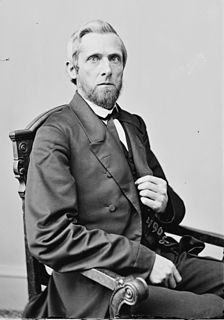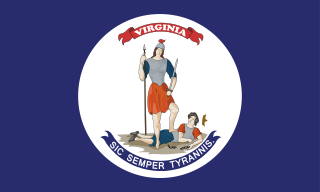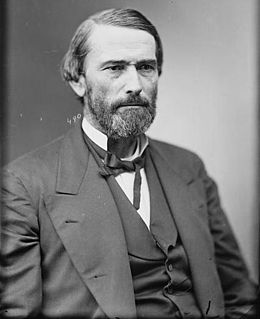
Clarksburg is a city in and the county seat of Harrison County, West Virginia, United States, in the north-central region of the state. The population of the city was 16,578 at the 2010 census. It is the principal city of the Clarksburg, WV Micropolitan Statistical Area, which had a population of 94,221 in 2014. Clarksburg was named National Small City of the Year in 2011 by the National League of Cities.

Francis Harrison Pierpont, called the "Father of West Virginia," was an American lawyer, politician and Governor of West Virginia during the Civil War prior to its admission into the Union. After the war, he was the Governor of Virginia during the early years of Reconstruction. In recognition of his significance to its state history, in 1910 the state of West Virginia donated a marble statue of Pierpont as the second of its two contributions to the U.S. Capitol's National Statuary Hall Collection.

Joseph Ellis Johnson was a farmer, businessman and politician who served as United States Representative and became the 32nd Governor of Virginia from 1852 to 1856, the first Virginia governor to be popularly elected as well as the only Virginia governor from west of Appalachian mountains. During the American Civil War, he sympathized with the Confederacy, but returned to what had become West Virginia for his final years.

John Letcher was an American lawyer, journalist, and politician. He served as a Representative in the United States Congress, was the 34th Governor of Virginia during the American Civil War, and later served in the Virginia General Assembly. He was also active on the Board of Visitors of Virginia Military Institute.

Waitman Thomas Willey was an American lawyer and politician from Morgantown, West Virginia. One of the founders of the state of West Virginia during the American Civil War, he served in the United States Senate representing first the Restored Government of Virginia and became one of the new state of West Virginia's first two Senators.

The Virginia Conventions have been the assemblies of delegates elected for the purpose of establishing constitutions of fundamental law for the Commonwealth of Virginia superior to General Assembly legislation. Their constitutions and subsequent amendments span four centuries across the territory of modern-day Virginia, West Virginia and Kentucky.

The U.S. state of West Virginia was formed out of western Virginia and added to the Union as a direct result of the American Civil War, in which it became the only state to declare its independence from the Confederacy. In the summer of 1861, Union troops, which included a number of newly-formed Western Virginia regiments, under General George McClellan, drove off Confederate troops under General Robert E. Lee. This essentially freed Unionists in the northwestern counties of Virginia to form a functioning government of their own as a result of the Wheeling Convention. Prior to the admission of West Virginia the government in Wheeling formally claimed jurisdiction over all of Virginia, although from its creation it was firmly committed to the formation of a separate state.

The Commonwealth of Virginia became a prominent part of the Confederate States of America when it joined the Confederacy during the American Civil War. As a Southern slave-holding state, Virginia held a state convention to deal with the secession crisis, and voted against secession on April 4, 1861. Opinion shifted after April 15, when U.S. President Abraham Lincoln called for troops from all states still in the Union to put down the rebellion, following the capture of Fort Sumter, and the Virginia convention voted to declare secession from the Union. A Unionist government was established in Wheeling and the new state of West Virginia was created by an act of Congress from 50 counties of western Virginia, making it the only state to lose territory as a consequence of the war.

William Gay Brown Sr. was a nineteenth-century politician and lawyer from Virginia, who was twice elected to the Virginia General Assembly and thrice to the U.S. House of Representatives. He also served at the Virginia Constitutional Convention of 1850 and later opposed secession at the Virginia Secession Convention of 1861. A leading Unconditional Unionist during the American Civil War, he became one of the founders of West Virginia.

Benjamin Wilson was an American lawyer and Democratic politician who served as a United States Representative from West Virginia) (1875-1883) and as an assistant attorney general during the administration of President Grover Cleveland.
William Alexander Harrison was a Virginia lawyer, judge and politician who helped found the state of West Virginia. He represented Harrison County, Virginia in the Virginia House of Delegates for three successive terms before the American Civil War and strongly opposed Virginia's secession. He helped form the new state of West Virginia and served as a circuit court judge during the American Civil War before winning election as one of the first judges of the Supreme Court of Appeals of West Virginia.

Mason Mathews was an American merchant and politician in the U.S. state of Virginia. A Whig, he served seven terms in the Virginia House of Delegates, representing Greenbrier County from 1859-1861.
Robert Edwin Cowan was a Virginia lawyer and politician who served in the Virginia House of Delegates and the Virginia Secession Convention of 1861 and as a Confederate officer. After the American Civil War, he moved to Kansas City, Missouri, where he resumed his legal practice and was elected a judge before his death and burial in St. Louis.
Robert Waterman Hunter was a Virginia newspaper editor and Confederate officer who twice served single terms in the Virginia House of Delegates and became the first Secretary of Virginia Military Records, as well as served as federal Inspector of Public Lands during the first Cleveland administration.

Gideon Draper Camden was a Virginia lawyer, judge and politician who opposed the creation of the state of West Virginia and sympathized with the Confederacy, but later served in the West Virginia Senate representing Harrison County.
Daniel Edward Frost was an American journalist, politician and soldier who twice served in the Virginia House of Delegates before the American Civil War. He helped found the state of West Virginia at the Wheeling Convention where he represented Jackson County and served as Speaker of the House of Delegates for the Virginia General Assembly at Wheeling, before he died fighting for the Union while leading the 11th West Virginia Infantry Regiment.














